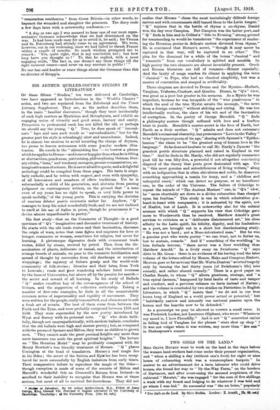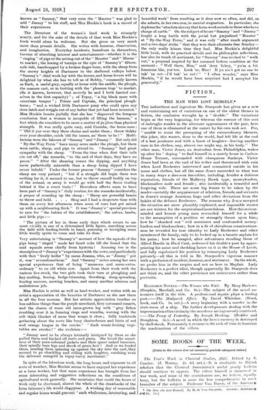TWO GIRLS ON THE LAND.'
Miss Ouvic HOCKIN went to work on the land in the days before the women land.workers had come under their present organization, and " when a shilling a day (without one's food) for eight or nine hours of exhausting work was a commonplace bargain." in answer to an advertisement for a farm labourer who could drive horses, she found her way to " By-the-Way Farm," on the borders of Dartmoor, and after overcoming the amused scepticism of the rubicund " Maester," she was engaged " for the sum of five shillings a week with my board and lodging to do whatever I was bold and go where I was bid." So successful was " the nu boiee," popularly
• Two Gigs on the Land. By Olive Heckle. London : E. Arnold.. [Si. 6d. net.} known as " Sammy," that very soon the " Maester " was glad to add " Jimmy " to his staff, and Miss Hockin's book is a record of their experiences.
The literature of the women's land work is strangely scanty, and for the sake of the details of that work Miss Hockin's book would alone be welcome. But she gives us very much more than prosaic details. She writes with humour, observation, and imagination. Everyday incidents, humdrum in themselves, become of absorbing interest and entertainment—whether it is the " ringing " of pigs or the setting out of the " Maester " and " Missus " to market ; the hoeing of turnips or the epic of " Sammy's" fifteen- mile ride, handicapped by a broken finger-bone, with the sheep from the snowy heights of Dartmoor to the sheltered valleys below. "Sammy's" chief work'lay with the horses, and horse-lovers will be delighted by what she has to tell us of Bobby, " commonly known as Barb, a useful grey, equally at home with the saddle, the plough, the manure cart, or in trotting with the ' pleasure trap ' to market. (Be it known, however, that secretly he and I both fancied our- selves in the first capacity) " ; of Topsy, " a big black mare with uncertain temper " ; Prince and Captain, the principal plough- team ; " and a wicked little Dartmoor pony who could open any door-latch and wriggle out of any halter that yet had been invented." Miss Hockin boasts joyfully that she has " disproved the foregone conclusion that a woman is incapable of lifting the harness," a feat which she considers to be more a matter of ju-jitsu than physical strength. It was really quite easy, said Coombe, the horse-man : " 'Old it yur over they there chains and under them ; throw thikky _ over your shoulder, catch 'old the 'erases, an' there 'ee be ! " Multi- farious were the labours of "Sammy " and "Jimmy." Not only did
By-the-Way Farm " have many acres under the plough, but there were cattle, sheep, and pigs to attend to. "Sammy" had great sympathy with the sheep. " From the time when first their tails are cut off," she remarks, " to the end of their days, they have no peace." " After the shearing comes the dipping, and anything more pathetically miserable than a sheep being dipped I have never beheld." Under the former process "Sammy" considers the sheep are very patient ; " but if a struggle did begin there was nothing for it, it seemed to me, but to throw oneself bodily on top of the animal, or away it would go with half the fleece trailing behind it like a court train ! " Herculean efforts seem to have been part of " Sammy's" daily routine, for she remarks incidentally, a propos of rounding up the sheep : " Sheep are powerful beasts to throw and hold. . . . Shag and I had a desperate time with them on every hot afternoon when some of ours had got mixed un with a neighbouring flock." It was "Jimmy's" special province to care for " the babies of the establishment," the calves, lambs, and little pigs :- " The picture of her in those early days which recurs to me most vividly is one of a determined little figure, marching across the field with feeding-bottle in hand, pursuing or inveigling some little woolly sprite to come and take its dose."
Very entertaining is "Sammy's" account of how the squeals of the pigs being " ringed " made her heart ache till she found that the said squeals arose chiefly from hysteria ! Amusing too is the description of " Jimmy's " experiences with the cows, and particularly with that " lively heifer " by name Joanna, who, as " Jimmy" put it, was " so rumbunctious." And "Sammy" notes among her own special experiences that of being " masseuse and nurse-extra- ordinary " to an old white sow. Apart from their work with the various live-stock, the two girls took their turn at ploughing and hay-making, hoeing, hedge-trimming, threshing, dung-spreading, loading manure, mowing bracken, and many another odorous and malodorous job.
Miss Hockin is artist as well as land-worker, and writes with an artist's appreciation of the beauties of Dartmoor as she saw them in all the four seasons. But her artistic appreciation touches on less sublime things than the purple moorland, fiery autumnal sunsets, 'and the charm of some old moss-grown log with " grey lichen rambling over it in foaming rings and wreaths, warring with the soft thick blanket of moss that wraps it close ; frilly toadstools gathering about the roots like busy chatterboxes and hints of red and orange fungus in the cracks." " Such comic-looking vege- tables are swedes ! " she exclaims :- " Jimmy used to be always intensely intrigued by them as she pulled them and hacked off roots and green. She loved the smart- ness of their puce-coloured jackets and their queer naked tummies, their spindly bare legs and shock of green hair ! And as we loaded them, sending them spinning up against the sky into the cart, they seemed to go chuckling and rolling with laughter, outdoing even the debonair mangold in topsy-turvy merriment."
In spite of the laborious work, the long hours and exposure to all sorts of weather, Miss Hockin seems to have enjoyed her experience as a farm worker, but that same experience has brought from her some interesting and suggestive reflections on the conditions of agricultural work generally. She maintains that could the hours of work only be shortened, almost the whole of the drawbacks of the farm labourer's life would disappear. A working day of reasonable and regular hours would prevent " such whelesome, interesting, and
beautiful work" from resulting as it does now so often, and did, as she admits, in her own case, in mental stagnation. In particular, she deplores the "absolute slavery that farm-work entails to those who have charge of cattle." On the subject of hours " Sammy " and "Jimmy" fought a long battle with the jovial but prejudiced " Maester " at " By-the-Way Farm," and it was only " after much argument and a two days' strike " that they won their alternate free Sunday— the only really leisure time they had. Miss Hockin's delightful little book, with its practical details and its philosophic reflections, has also its touch of sentiment, for " Sammy " was invited to " walk out," a proposal inspired by her assumed forlorn condition at the moment : " Well there, Miss," said 'Arry 'Jokey, " yu'm a bit lonesome like, yur too. Look 'ee, Miss! If yu ain't got no one to
tak"ee tak"ee oot ! " " I often wonder," says Mies Hockin, " if he would have been surprised had I accepted his generosity."



























 Previous page
Previous page